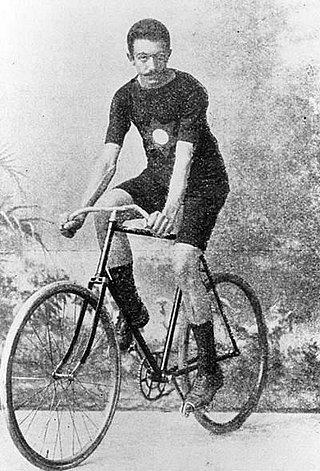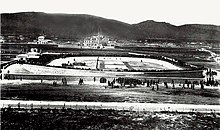
The 1896 Summer Olympics, officially known as the Games of the I Olympiad and commonly known as Athens 1896, were the first international Olympic Games held in modern history. Organised by the International Olympic Committee (IOC), which had been created by French aristocrat Pierre de Coubertin, the event was held in Athens, Greece, from 6 to 15 April 1896.

At the 1896 Summer Olympics, one wrestling event was contested. It was organized and prepared by the Sub-Committee for Wrestling and Gymnastics. Five competitors from four nations competed.

At the 1896 Summer Olympics, two weightlifting events were contested. The top two places were won by the same two men in each event, though their order was reversed for the two events. The bronze medals were split by the two Greek weightlifters. A total of seven men from five nations competed.

At the 1896 Summer Olympics, two tennis events were contested, both for men. They began on 9 April and continued on 8 April, 10 April, and 11 April. 13 or 15 competitors from six nations, including seven Greeks, took part in the tennis competition. Many of the doubles teams were of mixed nationality, including all three medalist pairs. None of the leading players of the time such as Wimbledon champion Harold Mahony, U.S champion Robert Wrenn, William Larned or Wilfred Baddeley participated. To strengthen the field, the organization added sportsmen from other Olympic events, including weightlifter Momčilo Tapavica, hammer thrower George S. Robertson and 800-metres runners Edwin Flack and Friedrich Traun.

At the 1896 Summer Olympics, five sport shooting events were contested. These events took place at the newly constructed shooting range at Kallithea. They were organized and prepared by the Sub-Committee for Shooting. Sixty-one shooters from seven nations competed.

At the 1896 Summer Olympics, eight gymnastics events, all for men, were contested in Panathinaiko Stadium. They were organized and prepared by the Sub-Committee for Wrestling and Gymnastics. Events took place on April 9, April 10, and April 11, 1896. There were 71 competitors from 9 nations that took part in gymnastics.

At the 1896 Summer Olympics, three fencing events were contested at the Zappeion. They were prepared and organized by the Sub-Committee for Fencing. The épée event for men was cancelled. All fencing was done to three touches. Events were held on 7 April and 9 April 1896. 15 athletes from four nations competed; 8 fencers from 3 nations won one medal each.

At the 1896 Summer Olympics, the first modern Olympiad, twelve athletics events were contested. A total of 25 medals were awarded. The medals were later denoted as 37 modern medals. All of the events except the marathon were held in the Panathinaiko Stadium, which was also the finish for the marathon. Events were held on 6 April, 7 April, 9 April, and 10 April 1896. Altogether, 63 athletes, all men, from nine nations competed. This made athletics the most international of the nine sports at the 1896 Games.

The men's individual road race was a cycling event at the 2004 Summer Olympics. It was held on 14 August 2004. There were 144 competitors from 43 nations. The maximum number of cyclists per nation had been set at five since professionals were allowed in 1996. The event was won by Paolo Bettini of Italy, the nation's first victory in the men's individual road race since 1992 and fifth overall. Sérgio Paulinho's silver was Portugal's first medal in the event. Belgium earned its first medal in the men's road race since 1964 with Axel Merckx's bronze.

The men's points race in cycling at the 2004 Summer Olympics consisted of a 160 lap points race with 16 sprints where points were awarded. The event was held on 24 August 2004 at the Athens Olympic Velodrome. There were 23 competitors from 23 nations, with each nation limited to one cyclist in the event. The event was won by Mikhail Ignatiev of Russia, the nation's first victory in the men's points race. Spain's Joan Llaneras, the defending champion, took silver; he was the first and only person to win multiple medals in the relatively short-lived points race, and ended with three medals after another gold in 2008. Guido Fulst of Germany took bronze, the first medal in the event for that nation since 1900.
The men's track time trial in Cycling at the 2004 Summer Olympics was a time trial race in which each of the 17 cyclists from 13 nations attempted to set the fastest time for four laps of the track. Nations were limited to two cyclists each. The event was won by Chris Hoy of Great Britain, the nation's second consecutive victory in the men's track time trial. Arnaud Tournant of France earned silver after a disappointing fifth-place finish four years earlier. Stefan Nimke put Germany on the podium for the second consecutive Games with his bronze.

France competed at the 1896 Summer Olympics in Athens, Greece, from 6 to 15 April 1896. French athletes had appeared in every Summer Olympic Games of the modern era, alongside Australia, Great Britain, and Greece. France won the fourth-most gold medals with 5 and the fourth-most total medals with 11. Cycling was the sport in which the French competitors had the most success, as they completely dominated the field. The French team had 27 entries in 18 events, winning 11 medals.

Greece was the host nation of the 1896 Summer Olympics held in Athens. The number of Greek contestants is commonly cited as 169, but as many as 176 Greeks contested events in all nine sports. The Greeks were by far the most successful nation in terms of total medals with 47, 27 more than the United States of America. Nevertheless, their number of first-place finishes (10) was one fewer than the Americans' 11. The Greeks had 172 entries in 39 events. Only 4 events had no Greek entrants—the 400 metres and the high jump in athletics and the vault and the team horizontal bar in gymnastics.

Greece has competed at every Summer Olympic Games, one of five countries to have done so, and most of the Winter Olympic Games. Greece has hosted the modern Olympic Games twice, both in Athens for the Summer Olympic Games, in 1896 and 2004.

The men's 100 kilometres was one of five track cycling events on the Cycling at the 1896 Summer Olympics programme. It was the first race held, on 8 April. It required cyclists to complete 300 circuits of the track. Nine cyclists from five nations competed. The event was won by Léon Flameng of France, with Georgios Kolettis of Greece coming in second.

The men's 12 hour race was one of five track cycling events on the Cycling at the 1896 Summer Olympics programme. It was the final event of the 1896 Summer Olympics, ending at 5 p.m. on 13 April. Seven cyclists from four nations started. The event was won by Adolf Schmal of Austria, the only gold medal in cycling ever won by the nation, until Anna Kiesenhofer's win in the 2020 Women's Road Race. Schmal lapped silver medalist Frederick Keeping of Great Britain early, winning by that lap as the two were the only riders to finish. The 12 hour race was the last event to finish at the 1896 Games.

The men's road race was the only road cycling event on the Cycling at the 1896 Summer Olympics programme. The course was 87 kilometres long and the race was held on 12 April. Seven cyclists from three nations competed. The event was won by Aristidis Konstantinidis of Greece. August von Gödrich of Germany took second, while Edward Battell finished third.

The United States competed at the 1920 Summer Olympics in Antwerp, Belgium. 288 competitors, 274 men and 14 women, took part in 113 events in 18 sports.

Greece competed at the 1912 Summer Olympics in Stockholm, Sweden. 22 competitors, all men, took part in 25 events in five sports. Greek athletes have competed in all Summer Olympic Games.

The men's individual road race at the 2000 Summer Olympics in Sydney, Australia, was held on Wednesday, 27 September 2000 with a race distance of 239.4 km. The estimated global TV audience was 600 million. They were specifically held in Sydney's Eastern Suburbs. There were 154 cyclists from 41 nations competing. The maximum number of cyclists per nation had been five since professionals were allowed in 1996. The event was won by Jan Ullrich of Germany, the nation's first victory in the men's individual road race. His teammate Andreas Klöden's bronze made this race the first time one nation had taken two medals in the event since 1988—when West Germany had done so by taking silver and bronze. Alexander Vinokourov took silver for Kazakhstan's first medal in the event.



















